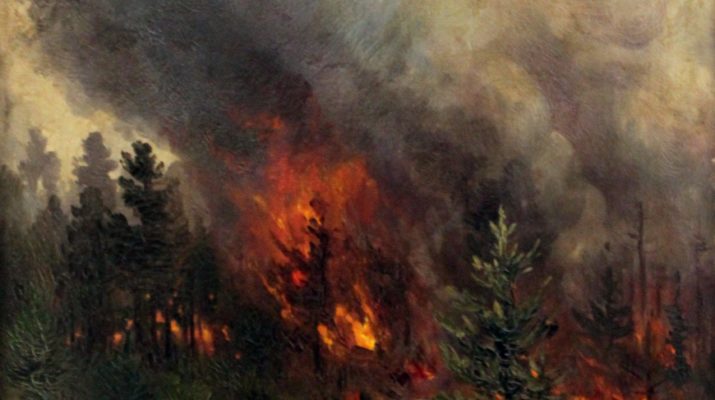Luke 12:49-56
Ordinary C38
49 “I have comeA to castB fireC upon the earth,D and how I wishE it were already ablaze!F
A “come” = erchomai. This is to come or go.
B “cast” = ballo. This is to throw, cast, rush, place, or drop. It is throwing, but it could be with more or less velocity and with more or less force/violence.
C “fire” = pur. This is fire, lightning, heat from the sun. Figuratively, it can refer to strife or trials.
D “earth” = ge. This is earth, land, soil, region, country, the inhabitants of an area.
E “wish” = thelo. This is to wish, desire, will, or intend. It is to choose or prefer in a literal or figurative sense. It can also mean inclined toward or take delight in. It can have a sense of being ready to act on the impulse in question.
F “ablaze” = anapto. 2x in NT. From ana (up, back, among, again, anew) + hapto (to touch, handle, kindle, lay hold of). This is to kindle or light.
50 I haveG a baptismH with which to be baptized,I and what constraint I am underJ until it is completed!K
G “have” = echo. This is have, hold, possess.
H “baptism” = baptisma. From baptizo (to submerge, wash, or immerse; used specially for baptism); from bapto (to dip or dye; to entirely cover with liquid, to stain). This is dipping or sinking. Also, the rite of baptism.
I “baptized” = baptizo. Related to “baptism” in v50. See note H above.
J “constraint…am under” = sunecho. Related to “have” in v50. 12x in NT. From sun (with, together with) + echo (see note G above). This is to hold together or hold fast, to close or press together. It can also be to be struck by an illness, arrested, compressed as by a multitude or a siege. Figuratively, it can mean to compel, perplex, preoccupy, or generally afflict.
K “is completed” = teleo. From telos (an end, aim, purpose, completion, end goal, consummation, tax; going through the steps to complete a stage or phase and then moving on to the next one). This is to complete, fulfill, accomplish, end.
51 Do you thinkL that I have comeM to bringN peaceO to the earth? No, I tell you, but rather division!P
L “think” = dokeo. From dokos (opinion). This is to have an opinion, seem, appear, think, suppose. It deals with a personal judgment. This is the root of the word “doxology.”
M “come” = paraginomai. From para (from beside, by) + ginomai (to come into being, to happen, become, be born; to emerge from one state or condition to another; this is coming into being with the sense of movement or growth). This is to arrive, appear, reach. It implies appearing publicly.
N “bring” = didomi. To give, offer, place, bestow, deliver. This is give in a literal or figurative sense.
O “peace” = eirene. Perhaps from eiro (to join, tie together to form a whole). This is one, peace, quietness, rest, peace of mind, harmony. Peace was a common farewell among Jews (i.e. shalom) and this well-wishing included a blessing of health and wholeness for the individual. This word also indicates wholeness and well-being – when everything that is essential is joined together properly. This is peace literally or figuratively. By implication, it is prosperity (but not in the sense of excessive wealth. Prosperity would have meant having enough from day to day.)
P “division” = diamerismos. 1x in NT. From diamerizo (to divide up, distribute, or share; figuratively, dissension); {from dia (through, across to the other side, thoroughly) + merizo (to divide, part, share, distribute, assign; figuratively, to differ); {from meros (part, share, portion figurative or literal); from meiromai (to get your share, receive one’s allotment)}}. This is a division, disunion. It could be a difference of opinion or behavior.
52 From now on fiveQ in oneR householdS will be divided,T threeU against twoV and two against three;
Q “five” = pente. This is five. It may be symbolically associated with the Temple or redemption.
R “one” = heis. This is one, a person, only, some.
S “household” = oikos. This is house – the building, the household, the family, descendants, the temple.
T “divided” = diamerizo. Related to “division” in v51. 12x in NT. See note P above.
U “three” = treis. This is three.
V “two” = duo. This is two or both.
53 they will be divided:
fatherW against sonX
and son against father,
motherY against daughterZ
and daughter against mother,
mother-in-lawAA against her daughter-in-lawBB
and daughter-in-law against mother-in-law.”
W “father” = pater. This is father in a literal or figurative sense. Could be elder, senior, ancestor, originator, or patriarch.
X “son” = huios. This is son, descendant – a son whether natural born or adopted. It can be used figuratively for other forms of kinship.
Y “mother” = meter. This is mother in a literal or figurative sense.
Z “daughter” = thugater. This is daughter, a related female or one who lives with you.
AA “mother-in-law” = penthera. 6x in NT. From pentheros (specifically a wife’s father). This is the wife’s mother.
BB “daughter-in-law” = numphe. 8x in NT. Perhaps from nupto (to put on a veil as a bride does – in Latin nupto means simple to marry); related to numphon (the room where the marriage bed is). This is bride, daughter-in-law, young wife, or young woman. This shares a root with “nymph” and “nymphomaniac.”
54 He also said to the crowds,CC “When you seeDD a cloudEE risingFF
CC “crowds” = ochlos. Related to “have” and “constraint…am under” in v5. Perhaps from echo (see note G above). This is a crowd, the common people, a rabble. Figuratively, it can refer to a riot.
DD “see” = horao. To see, perceive, attend to, look upon, experience. Properly, to stare at and so implying clear discernment. This, by extension, would indicate attending to what was seen and learned. This is to see, often with a metaphorical sense. Can include inward spiritual seeing.
EE “cloud” = nephele. From nephos (cloud; figurative for a great crowd or multitude). This is cloud or cloudiness.
FF “rising” = anatello. Related to “is completed” in v50. 9x in NT. From ana (up, again, back, anew) + tello (to cause to arise); {from telos (see note K above)}. This is rise, shine, or dawn. It is most often used of the sun. Figuratively, it can mean achieving a goal or reaching consummation after completing the needed steps.
in the west,GG you immediatelyHH say, ‘It is going to rain,’II and so it happens.JJ
GG “west” = dusme. 6x in NT. From duno (to enter, sink into; can also be set like the sun); from duo (to sink). This is a setting i.e. the west, the region to the west, or the sunset.
HH “immediately” = eutheos. From euthus (immediately, upright, straight and not crooked); {perhaps from eu (good, well, well done, rightly) + tithemi (to place, lay, set, establish)}. This is directly, soon, at once.
II “going to rain” = ombros + erchomai. Literally, “a shower is coming.” Ombros is 1x in NT. It refers to hard rain or a thunderstorm. Erchomai is the same as “come” in v49. See note A above.
JJ “happens” = ginomai. Related to “come” in v51. See note M above.
55 And when you see the south windKK blowing,LL you say, ‘There will be scorching heat,’MM and it happens. 56 You hypocrites!NN
KK “south wind” = notos. 7x in NT. This is south wind, hence, a reference to the South.
LL “blowing” = pneo. 7x in NT. This is to breathe or to blow as a breeze.
MM “scorching heat” = kauson. 3x in NT. From kaio (to kindle, light, blaze; light in a literal or figurative sense) OR from kausoo (to burn up; a fire with high heat); from kausis (burning, burning up); from kaio (see above). This is a glare, a scorching heat, a hot wind.
NN “hypocrites” = hupokrites. 18x in NT. From hupokrinomai (to answer, pretend, respond as an actor on stage; figuratively, to lie) {from hupo (by, under, about) + krino (to judge, decide, think good, condemn, determine, pass judgment, stand trial, sue; judging whether in court or in a private setting; properly, mentally separating or distinguishing an issue – to come to a choice or decision, to judge positively or negatively in seeking what is right or wrong, who is innocent or guilty; can imply trying, condemning, punishing, or avenging.)}. This is literally an actor. Figuratively, it is someone playing out a role, which is to say, lying, pretending, or being a hypocrite. This is where the word “hypocrite” comes from.
You knowOO how to interpretPP the appearanceQQ of earth and sky,RR but why do you not know how to interpret the present time?SS
OO “know” = eido. This is to know, consider perceive, appreciate, behold, or remember. It means seeing with one’s eyes, but also figuratively, it means perceiving – seeing that becomes understanding. So, by implication, this means knowing or being aware.
PP “interpret” = dokimazo. Related to “think” in v51. From dokimos (what passes the test, approved, acceptable, genuine, verified); from dechomai (to warmly receive, be ready for what is offered, take, accept, or welcome; to receive in a literal or figurative sense) or dokeo (see note L above). This is to test, examine, prove. It is to approve after subjecting to a test to determine if it is real or acceptable. It is to test in a literal or figurative sense.
QQ “appearance” = prosopon. Related to “see” in v54. From pros (at, towards, with) + ops (eye, face); {from optanomai (to appear, be seen); perhaps from horao (see note DD above)}. This is the face, surface, or front. It can imply presence more generally.
RR “sky” = ouranos. May be related to oros (mountain, hill) with the notion of height. This is the air, the sky, the atmosphere, and heaven. It is the sky that is visible and the spiritual heaven where God dwells. Heaven implies happiness, power, and eternity.
SS “time” = kairos. This is season, opportunity, occasion. The word chronos is used for chronological time. Kairos is used for spiritually significant time – the right time or appointed time.
Image credit: “Forest Fire” by Alexey Denisov-Uralsky, 1897.




